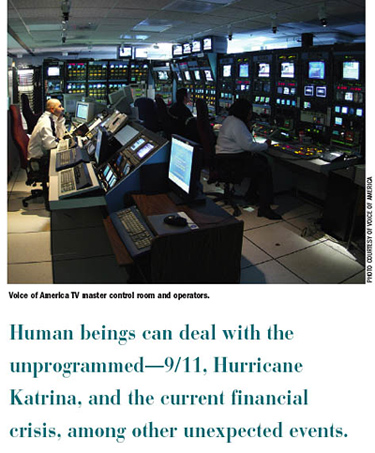Expecting the Unexpected
What did Garry Kasparov, Lane Kirkland, and Russell Crowe have in common? How about 9/11, Hurricane Katrina, and the current global financial crisis? The answers could be important to your plans regarding labor and equipment…
Programmable systems are wonderful devices. Instead of spending hours adding columns of numbers, you can have a calculator do it for you. Instead of remembering which thread color to weave into a rug pattern, you can have an automated loom do it for you. And in master control? A long, long time ago, programming and commercials might have come in to a TV station on photographic slides or reels of film. Later, that changed to tape reels or cassettes.
Either way, there was a library where they were stored, someone to take the appropriate material from the library to the playback machines, someone to run the machines, someone to switch the appropriate machine or feed onto the air and keep an eye on the transmission, and probably someone else to make a list of what got aired when.
A lot of equipment, labor and time was required to get things ready. These days, things are different. The library, the messenger, and the playback machines might be replaced by a single server (with built-in redundancy, of course). It's smaller and faster (not counting the need to load it from one or more of those obsolete playback devices or inbound feeds).

It can also easily be controlled by an automation system. That automation system should be a labor-saving innovation, too. It can often accept direct inputs from a traffic system, eliminating the need for someone to provide notes about what needs to be played when. In conjunction with some automatic signal monitoring, it could, in theory at least, eliminate the need for a master- control operator entirely. Again, that's the theory.
EIN MINUTEN BITTE!
The producer of a live show fed to a network with an automation system has a complaint. In the old days—even in the age of gigantic quadruplex videotape players with large, heavy, two-inch tape reels—he could call master control, beg for a minute or two of extra time, and have the technicians dig up some smaller interstitial material to meet the request.
Once the network switched to an automation system, that flexibility was lost. That's not the fault of automation systems in general. Flexibility can be programmed into them. But, like all programmable devices, they can do only what they are programmed to do. On one level, it's actually quite simple to program a computer to play a perfect game of chess every time.
All the programmer has to do is have the computer try every possible game. For each game that's lost, the computer remembers to avoid the losing move. After it has discarded every possible wrong move for every possible game, the computer can't be beat. Unfortunately, the number of possible chess games has been estimated to be about 10 trillion raised to the power of 50. It's easier to say that, even with today's technology, computers aren't really up to the task.
KASPAROV, KIRKLAND AND CROWE
That's why chess master Garry Kasparov was able to defeat IBM supercomputer Deep Blue in 1996. The U.S. Department of Labor's Hall of Fame calls Lane Kirkland a "master builder of the labor movement," in part for bringing the Teamsters, the United Auto Workers, and the United Mine Workers back into the AFL-CIO.
Kirkland was also a licensed ship's master, in the same sense as the character portrayed by Russell Crowe in the movie "Master & Commander: The Far Side of the World." Human beings can deal with the unprogrammed—9/11, Hurricane Katrina, and the current financial crisis, among other unexpected events. Computers don't know when to discard programmed playlists, because their programmers didn't anticipate surprise conditions.
That's why the point in your broadcast operation where someone can make last-minute decisions based on unfolding events is called "master control." Of course, Kasparaov lost to Deep Blue the year after he beat it, union membership in the United States dropped rapidly during Kirkland's presidency of the AFL-CIO, and Russell Crowe's 1997 movie "Breaking Up," which opened not even three years before his blockbuster "Gladiator," pulled in less than $12,000 in theaters. Maybe you could use more than one person in master control.
Mark Schubin is an engineering consultant whose clients range from the Metropolitan Opera to Sesame Workshop.
The professional video industry's #1 source for news, trends and product and tech information. Sign up below.
